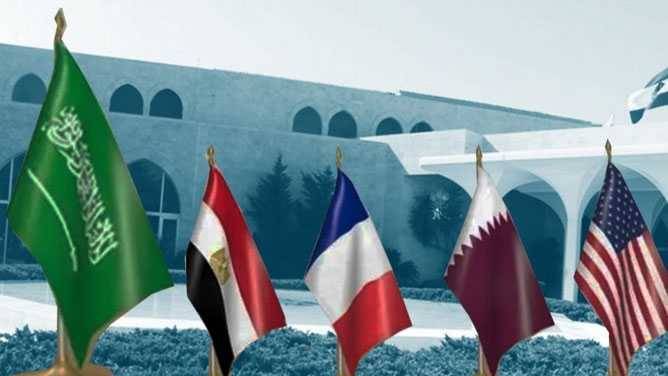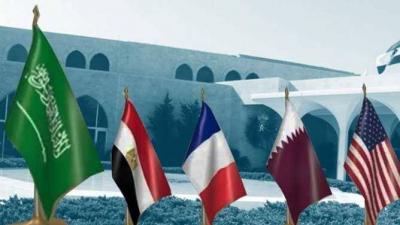Practically, nothing is expected on the presidential election front until the beginning of next month, when ambassadors from the Arab and international “Quintet” will resume their meetings with officials, religious and political leaders, and heads of parliamentary blocs. This follows their completion of the first round of these meetings over two consecutive days, aiming to achieve consensus among the relevant parties on electing a new President of the Republic. The proposed roadmap involves a dialogue leading to consecutive electoral sessions and then to the election of a president.
Amid the activities of the Quintet ambassadors, a significant development emerged yesterday with the United Arab Emirates unexpectedly opening up to Hezbollah after a significant rupture that began with the Yemen crisis. Abu Dhabi welcomed Hezbollah’s coordinator and liaison officer, Haj Wafiq Safa, who traveled there yesterday on a private plane accompanied by two individuals. The rift between the two parties arose from the Yemen crisis and was followed by the detention of approximately ten Shiite Lebanese workers by the UAE authorities, along with a halt on issuing visas to others. Safa's visit to Abu Dhabi is expected to culminate in the release of these individuals.
An informed source told "Al-Jumhuria" that Safa's visit indicates a significant political openness between the UAE and Hezbollah, which is anticipated to have very important outcomes for the future relationship between the UAE and Hezbollah specifically and between Hezbollah and the Gulf Cooperation Council countries in general.
Meanwhile, following two days of intensive meetings among the Quintet ambassadors, they have become convinced that the roadmap for electing a President of Lebanon has become clear and its outlines solidified during a meeting at Ain Al-Tineh with Speaker Nabih Berri, with the agreement of all committee members. According to a prominent political source familiar with the discussions, the process will begin with a dialogue or discussion table headed by Speaker Berri as the president of the parliament, followed by the deputies entering a voting session with a complete quorum guaranteed by a written covenant ensuring attendance and preventing any disruption. The first round will commence, and if no candidate receives 86 votes, a second round will be held if a candidate secures 65 votes to elect the president. If that fails, a third and then a fourth round will take place. If the situation remains unchanged, meaning no agreement is reached on the required number of votes, Speaker Berri will conclude the session and adjourn it. He will then continue to call for similar sessions until the election is completed.
However, this path, considered logical by the Quintet ambassadors and aimed at achieving the goal, quickly dissipated during their meeting with the Christian opposition forces, as the source confirmed to "Al-Jumhuria" that the Quintet’s initiative faced a setback and pronounced itself dead due to the stubbornness and rejection from the Christian opposition, first for President Berri to chair the dialogue as he is a party to the situation, and second due to a genuine fear of the potential election of the head of the Marada Movement, Suleiman Franjieh, within this framework. Therefore, this team further moved towards demanding consensus on a third name before entering the session, which is categorically rejected by the Shiite duo, indicating that the initiative has hit a dead end. The source stated that there are no results from this round, but nothing is over, and an attempt will be made after Ramadan, despite things becoming increasingly difficult and discussions leaning towards fruitlessness.
The Quintet ambassadors: Saudi Arabia's Walid Bukhari, France's Hervé Magro, Qatar's Saud bin Abdul Rahman Al Thani, Egypt's Alaa Mousa, and the US's Lisa Johnson, concluded yesterday the first phase of their tour with Lebanese leaders. After visiting Speaker Nabih Berri and Maronite Patriarch Bechara Boutros Al-Rahi the day before, they visited former president General Michel Aoun in Rabieh yesterday, briefing him on the summaries of their meetings and their plan to advance the presidential process.
During the meeting, Aoun emphasized the need for the presidential candidate to have the willingness and capability to address the crises faced by Lebanon, particularly regarding the economy and security, and to follow up on investigations into financial crimes. "Al-Jumhuria" learned that Aoun focused during the meeting on the reformative qualifications needed for the next president and the continuation of investigations into waste and safeguarding the deposits of Lebanese citizens, leading to accountability for those responsible.
On the sidelines of the Quintet's activities, while Lebanon awaits the arrival of US presidential envoy Amos Hochstein, the UN Special Coordinator for Lebanon, Joanna Wronecka, and the Under-Secretary-General for Peacekeeping Operations, Jean-Pierre Lacroix, briefed the Security Council on the implementation of Security Council Resolution 1701 during a closed consultation session to discuss the latest report from UN Secretary-General Antonio Guterres regarding this resolution.
On another note, a discussion took place during yesterday's Cabinet session concerning the appointment of customs guards, which has been stalled since 2023 due to sectarian imbalances, involving 200 guards. "Al-Jumhuria" learned that the Christian ministers were poised to object to the reappointment due to the glaring sectarian imbalance, noting that all appointees were Muslim with no Christians among them.
Minister of Information Ziad Makary confirmed to "Al-Jumhuria" that there was no tension during the session regarding this issue; rather, all ministers understood the necessity of addressing the highlighted problem. He noted that Prime Minister Mikati was wise in handling the matter until solutions could be found, and a number of proposed solutions would be discussed later.
In official information regarding the session, when the matter concerning the Ministry of Finance's request to resolve the dispute in the Supreme Customs Council regarding the appointment of successful guards from the examination for the customs authority was raised, the Prime Minister stated: "I do not permit the dispute in the Supreme Customs Council to be brought to the level of the ministers. I also do not allow any party or political faction to exploit this issue with populist language seeking to achieve gains and score points. I am keen on addressing this topic from the perspective of caring for everyone, for national unity, and to avoid any disagreements at any level within the Council of Ministers, especially given the topic’s sectarian background. I requested further study with confirmation of the previous Cabinet's decision. I invite everyone to approach the file objectively, away from the ugly sectarian exploitation."
Ministerial sources told "Al-Jumhuria" that the discussion nearly turned into a debate among the ministers on this matter, as some ministers raised the issue of their colleagues’ boycotts of sessions while simultaneously sending numerous requests and draft decrees to the Cabinet for approval, forcing the Cabinet to push through the urgent ones. They noted there is an urgent need for the concerned minister to clarify their request, as submissions are sometimes general or require detailed explanations. Consequently, some ministers requested either the attendance of the boycotting ministers or that they refrain from sending any requests specific to their ministries.
Furthermore, it was reported that the Cabinet approved a draft decree to amend paragraphs 3 and 4 of item one in Article 6 of the decree granting a temporary compensation to all public sector employees and retirees benefiting from a pension, ensuring that the increase is no less than eight million Lebanese pounds. The Cabinet also agreed to issue an authorization from the President of the Republic after ministers waived their right to request reconsideration of the decision.




